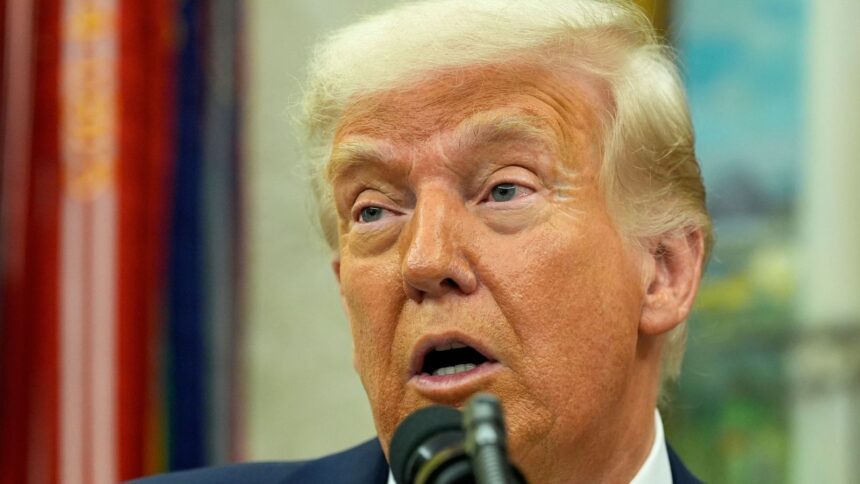China’s fresh offensive in its escalatory spiral against US President Donald Trump’s tariff war could potentially push the trade slugfest between the top two global economies to a point of no return, and could end up singeing countries such India. According to Martin Wolf, chief economics commentator at the Financial Times, London, the possibility of the global trading system getting split is a very plausible outcome after Beijing’s latest salvo to match Trump’s Liberation Day farrago.
“I mean, it seems to me the (most) probable outcome. With Europe interestingly in the middle. There are three major trading powers. The EU is not of course a major power but it’s a very much a major trading power and it looks to me as though it’s certain that what the US will say to all the other trading partners is we won’t impose these reciprocal tariffs on you that we have temporarily waived if you put a prohibitive tariff on China. I assume that’s what’s going on. And completely predictably, China is saying, well, if you do that, we’re going to retaliate against you. Of course they are! So, the countries will have to choose, it seems to me, whether they’re going to be in a bloc with the US or in a bloc with China. And that’s going to be a very, very difficult choice for many countries who have extremely important trading relations with both,” Wolf told .
This sort of choice, he said, will also apply in some respects to India. “Now, I assume India will choose America for obvious reasons, but it will still be a very difficult choice. And having outright hostile relations with China in economics, as well as on security issues, the Himalayas and so forth, will be a very big issue, I imagine, for India, it’s a terrible situation, and should never have been allowed to happen. But this looks to me what is going on. And the whole host of countries, Australia, for example, are going to find all this very, very difficult to handle”.
Prospect of disparate trade blocs: Where will India stand?
Beijing’s latest offensive comes just days after Chinese President Xi Jinping wrapped up a tour of three neighbouring countries — Vietnam, Malaysia and Cambodia — all countries that were slapped initially with high reciprocal tariffs and which are said to be in the rush to secure favourable terms from the White House. This retaliatory move by China could could throw up three possible outcomes — ensure that a rapprochement between Washington and Beijing would get even tougher, given that the gap between the two negotiating sides has further widened; alongside the threat to broadly bifurcate global trade into a couple of disparate blocks even as the events reinforce China’s position as the original trade bully.
If two distinct trading blocs are a reality, then is there a prescription for India and can it make the best of a bad bargain? “India has weight. After the three great economic powers, India is… the country that sort of matters most by far, clearly, because of its size and potential economic dynamism. So both sides will want it to align with them. And it has enough weight, it seems to me, to avoid being forced to make a choice. Or at least if I were India, I would try to avoid making a choice…”
“Of course, there are natural reasons to want to be close to the US and the West. They’re very important trading partners, economic partners and potentially security partners. You want them to balance to some extent the power of China, which is very close to you, obviously. So you want to preserve that. But I do think that India will always be a neighbour of China. China is always going to be an important country and you don’t want to turn it into an outright enemy. I mean that seems to me also wise. So I think if I were, God forbid, advising Indian policymakers I would say you probably have enough weight to avoid being forced to make the choice and if you can use that weight to avoid making an outright choice, then you should try and avoid making that outright choice and being sort of a bit in the middle, as you have been over the Ukraine war, to give an example… And I think that’s what you should try to do here. Because it is quite possible the next president of the United States, I’m not predicting it, will have quite a different policy. He will try to reconcile, to open up again somewhat at least to China. And China won’t forgive. And… China will not forget. China has very long memories. And your relationships with China might be poisoned. This is very, very difficult and it might be very difficult to avoid making a choice, even if you would rather not”.
On the world economy’s China problem, which had been allowed to fester for over two decades, even as Beijing has not hidden its intent to weaponise its manufacturing dominance, Wolf said there should have been a multilateral effort much earlier to counter the China problem. “I think there’s a reasonable chance that (a multilateral effort led by the US, and under the WTO) would have worked. Whether it would have, I don’t know, because nobody tried. Not really. Trump never tried that. The other leaders in the US and Europe have never been able to cooperate, and the rest of the world wasn’t really engaged…” he said.
Can China weather the trade tariff storm?
On whether China has more staying power to weather the current trade storm, Wolf said the Americans will have to be much cleverer than they’ve been so far to be anywhere close to winning this. “They (the US) cannot close China out of the world completely. I don’t think that’s in any way a realistic bet, given China’s economic and military size… It has huge degrees of freedom. It can generate domestic demand, reduce its export dependency, create more demand for other countries to sell things into China. It’s shown remarkable innovative capacity.
So, of course, America can stop it from getting access to certain technologies, there’s a limit to how effective that seems to be. And so China has tremendous room for maneuver. America, on the other hand, as you say, it’s politically fragile. The economy looks somewhat fragile now. The markets look fragile… This trade war is going to damage American business very, very considerably. It’s going to make the supply chains in America extremely fragile already, likely to break quite a number of them. The supply shock here could be really quite damaging.”
And all this, Wolf said, underlines the unpredictability of America, because America will clearly have started this, and it shows that this is not an ally you can trust. “Remember, it is attacking its own allies… So I’m inclined to think objectively that China is likely to come out of this better than America. As a Westerner, I find that a bit depressing, but I would also say the Americans will probably deserve it.”








